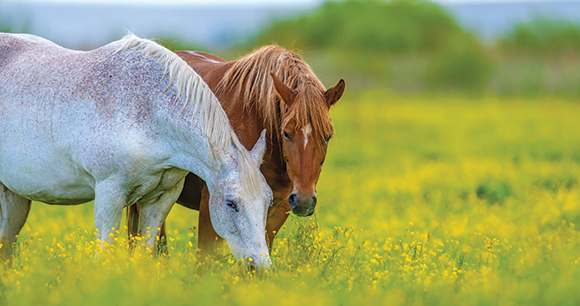For the upcoming fiscal year, beginning October 1, AWI provided members of Congress with a list of priorities covering the welfare of companion animals, farmed animals, marine mammals, and other wildlife. We also submitted testimony to the House and Senate appropriations committees and circulated lawmaker sign-on letters to the committees on important animal welfare issues.

Thirty-three senators and 173 representatives signed on to letters—led by Sen. Ron Wyden (D-OR) and Reps. Chris Smith (R-NJ) and Earl Blumenauer (D-OR)—highlighting measures to bolster enforcement of the Animal Welfare Act and the Horse Protection Act and supporting continued funding for grants to aid domestic violence survivors and their pets. A bipartisan letter led by Reps. Don Beyer (D-VA), Raul Grijalva (D-AZ), and Debbie Dingell (D-MI) requesting full funding for the Endangered Species Act was signed by 137 representatives. Fifty-three representatives joined a letter led by Rep. Jared Huffman (D-CA) in support of funding the Marine Mammal Commission, the Prescott Grant Program (to help stranded marine mammals), and the Unusual Mortality Event Contingency Fund. Letters led by Reps. Vern Buchanan (R-FL) and Jan Schakowsky (D-IL) and Sen. Robert Menendez (D-NJ)—joined by 120 representatives and 26 senators—urged inclusion in fiscal year 2025 legislation of a permanent prohibition on the domestic slaughter of horses.
Seventy-seven representatives and 15 senators signed on to letters—led by Reps. Dina Titus (D-NV), David Schweikert (R-AZ), and Steve Cohen (D-TN) and Sen. Cory Booker (D-NJ)—requesting wild horse and burro management reforms. The reforms would ensure that the Bureau of Land Management expends a significant portion of its budget on proven and safe fertility control methods to keep herds in their natural habitat, as well as bar the use of risky surgical procedures to curb population growth.
Forty-seven representatives joined a bipartisan letter led by Rep. Ro Khanna (D-CA) requesting that livestock operations be required to have disaster preparedness plans in place to protect their animals as a prerequisite to receiving federal compensation for losses incurred during extreme weather events and natural disasters. AWI also worked with lawmakers to advance appropriations language calling for (1) stronger enforcement of the Twenty-Eight Hour law—the main federal statute to protect farmed animals during transport; (2) increased oversight of the handling of birds at slaughter; and (3) shifting the poultry industry away from killing animals via ventilation shutdown plus heat, an inhumane method used widely during the ongoing avian influenza outbreak to destroy flocks exposed to the virus.